“Same Time, Same Place,” by Douglas Petrie
This episode has a very literal title: the time is 9:24, and the place is the airport, at least in the beginning. We know this because we get an unnecessarily good eyeful of the airport clock and, below it, a bunch of insignificant—yet moderately memorable—deplaning passengers. Once that’s established, we go to Buffy, Dawn, and Xander, who are anxiously waiting for Willow to arrive. Xander has a yellow crayon sign and some understandable pride over having saved the world from the destructive rage of his oldest friend.
Pride aside, they’re all finding it a little weird, this upcoming reunion. The tension only increases when Buffy’s obliged to confess that Willow didn’t exactly finish what she was up to in England, this thing with Giles and his coven friends that Xander and Dawn are calling a recovery course.
“She didn’t finish not being evil?” Dawn demands.
While they’re freaking out about Willow’s failure to unlock the No Longer Keen to Fry the Planet achievement, Xander notices that everyone is now off the plane from London… and all that awkwardness they were worried about has come to a fizzle.
Same time, same place: we go back to 9:24 and the same shot of the same airport, and this time Willow’s squeezed into a space between the various plane-exiting extras. Strangely, nobody’s there waiting for her.
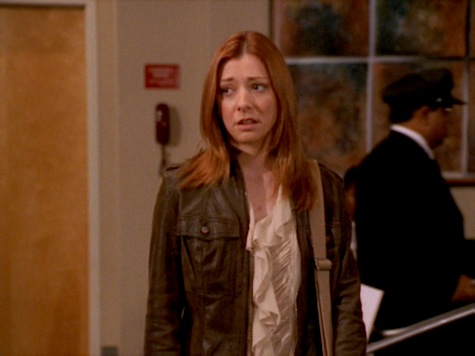
This may be another of those small plot set-ups that works less well in the age of everyone having a cell phone. Nowadays, we all start texting whoever’s picking us up, as soon as we’re on the ground.
Elsewhere in Sunnydale, a graffiti artist is being mocked and then attacked by an overly chatty monster. I bet the city is covered in half-finished tags.
Willow arrives at the Summers home—we get a microwave clock, this time, to show us some time has passed—and nobody’s there. She wanders through the empty house, looking sad and worried as she searches for her loved ones. She homes in on the spot where Tara died. Bummer. She finds the family phone list, and she’s not on it. Double bummer.

Then she goes running downstairs when she thinks she hears the door. But nobody’s there, as far as she can tell, and so she settles down on the couch to snooze out the wait until they arrive.
By now it’s easy to figure out that Buffy, Xander and Dawn slammed that door when they arrived home. They’ve checked that Willow got on a plane in London and are wondering if she got off at O’Hare. They worry that she’s evil again. When Willow came bolting downstairs, they heard her. But a search of the house reveals nobody home but them.
Back in London, Buffy reports, Giles is feeling guilty about having let Willow go. Buffy herself has some guilt. Dawn points out that if Willow has scampered off, it’s her responsibility to come back. That by default, she’s the one in the wrong. Buffy, somewhat reluctantly, agrees. She’s fully aware that this doesn’t bode well, and she really doesn’t want to fight Willow again, but part of her is hoping for the best.
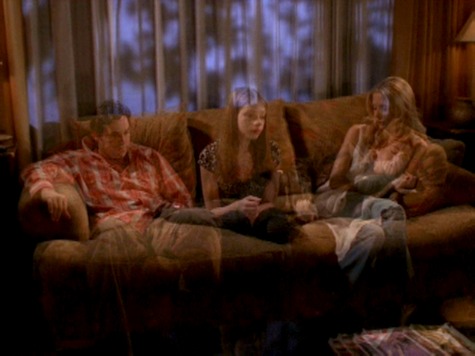
The three of them vanish and we go back to Willow, asleep on the couch, in a transition that has something marvellously fairy-tale about it. She wakes—still no friends. She tries to call Giles and doesn’t get through; doesn’t leave a message either. It’s poignant and sad.
Then she heads to the boarded-up Magic Box, where Anya sees her. Hurrah, Anya sees her! Less of a hurrah is that Anya is emphatically not so happy to see her. Willow expresses penitence, for having hurt Anya and trashed her place of employment. She tells her to go ahead and let her have it, verbally, which sucks the wind out of whatever vengeful lecture Anya was gearing up to deliver.
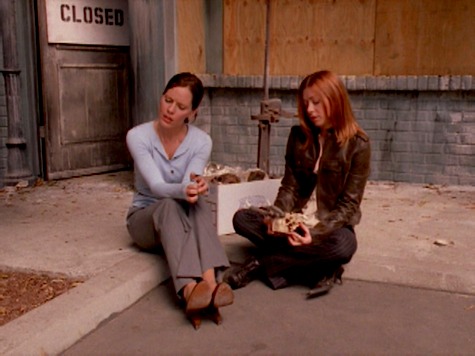
Anya tells her about the gang’s ties to the new high school: Buffy and Xander both working onsite, Dawn possibly attending classes—though we all doubt it, don’t we?—and Spike on rat patrol in the basement. She suggests Willow try the construction site if she’s looking for Xander.
As a result, Willow and BuffXander end up in the same time and place again, unaware of each other, and simultaneously finding some deeply gruesome skinless corpses. Willow flees, making creaky ladder noises that the others hear but don’t really register. They’re too busy worrying they’re seeing the second going of Warren.
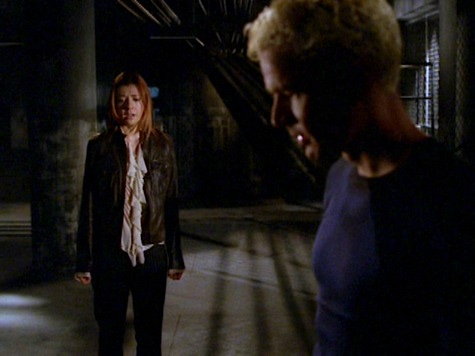
Willow’s next stop is the basement of the high school. Like Anya, Spike can see her. Spike is still running the Gabbling William operating system, though, so the only thing he says that she really understands is an observation that the most recent town flaying, prior to yesterday, was her doing.
It’s a weird and disjointed scene, as seen from her POV, but then Buffy and Xander arrive. Or, really, it turns out they were there almost all along. Amazingly enough, Spike’s half of the conversation makes marginally more sense the second time through. (The writing on this particular encounter is especially deft, I think, and James Marsters does well it it.)
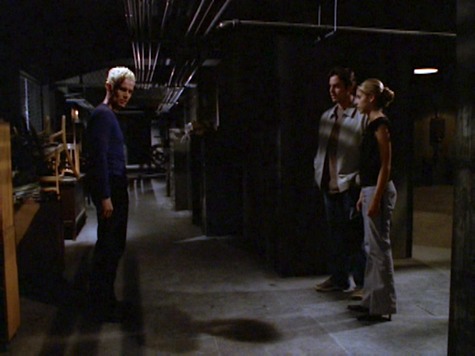
He does try to tell Buffy what’s going on, but his on-point utterances: “My money’s on the witch” and “Red’s a bad girl” only serve to incriminate Willow further in her friends’ eyes. In his unhelpful kook way, he then wanders off.
What’s a deeply confused invisible witch with jetlag to do? Willow runs back to Anya, looking for help and, perhaps sympathy. They do a search for demons, the same spell Willow and Tara did, the one Tara sabotaged way back when. Oh, we miss Tara! They find evidence of many demons at the high school, so many that they set the map on fire, damaging Anya’s carpet, and dampening her afternoon surge of Scooby spirit.

Willow asks Anya to teleport to the most likely location of the suspected skin-eater, a cave, and we learn that she cannot teleport anymore unless it’s on official business. This is a punishment for her withdrawn that wormifying spell on Ronnie the nasty boyfriend last week.
The two women connect, briefly, over the painful reality of their having been viciously villainous, and their fears surrounding being evil again. Then Willow makes for the cave.
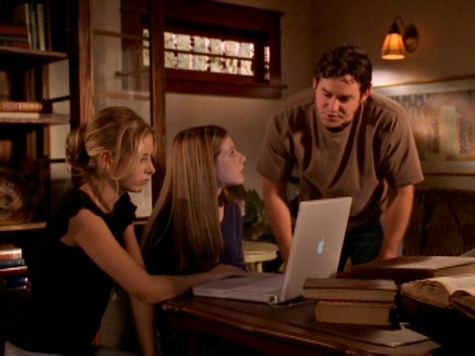
Demon-hunting of a more old-school Giles variety, meanwhile, has taken over the Buffy household. Dawn is officially a researcher now, searching indexes of nasty beings, checking both for demons that flay and demons that skin.
Buffy’s feeling antsy and concerned, overcome by that urge she gets to just go out and pummel whoever shows up. When Dawn finds the likely culprit, she’s afraid to let herself believe it isn’t Willow. But Dawn is persuasive, and it turns out that what they need next is someone who can detect the traces of blood left behind by the monster, a messy eater by the name of Gnarl.
Hmmm, blood trackers, Buffy thinks. Wouldn’t it be nice and distracting to coax Spike out of the school basement?
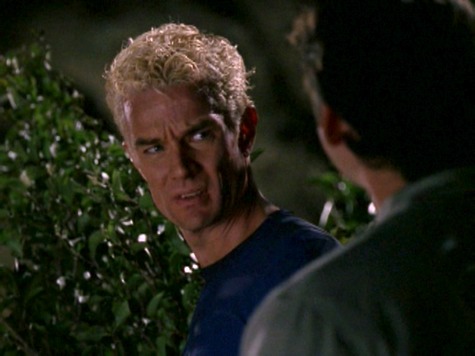
Nice or not, he’s certainly distracted. He leads them to a cave, babbling all the while. It is the same cave Willow tried to have Anya scout out. She is already there.
The demon starts taunting Willow—they all hear it—and then rushes the Scoobies. Dawn gets scratched and paralyzed. The gang flees, collapsing the cave exit as they go, with the tactical idea of keeping the thing trapped until they make it back. Which is good as far as it goes, except that it leaves InvisiWillow locked in with Gnarl.
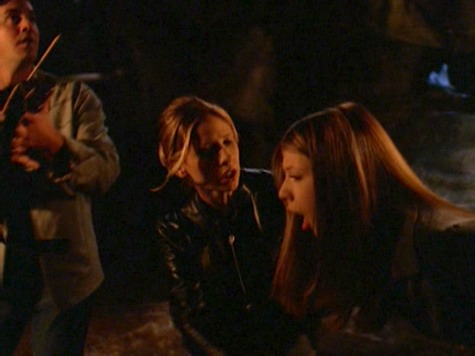
Gnarl is so very happy that the Scoobs have abandoned his supper. He scratches and paralyzes her, and goes on at long and not very loquacious length about how the gang must have left her there deliberately. Clearly he likes his food with angst when he can’t get hot sauce. He’s lapping at the blood in her belly wound when we switch to the gang, who are just arriving home with Paralyzed Dawn.
They snatch up the books and read the rest of the Gnarl entry. (Um, guys? Why not read the whole thing before you leave? Or in the car?) Dawn’s scratch-inflicted paralysis lasts, it turns out, until Gnarl dies.
The upside of this is that Buffy has a good reason to head back to that cave pretty quickly. And what with Gnarl being a taunter, the kind of guy who likes to play with his food, he is digesting Willow very slowly indeed. There might be something left for Buffy to find and save, if only she can manage to see it.
The poetic justice here in “Same Time, Same Place,” is pretty thick on the ground. Willow didn’t torture Warren for long, but that was only because she didn’t want her friends to stop her. Having tormented and skinned him, she now faces a slow and agonizing death by the same means. Added to that is the emotional desolation of believing that her friends may have put her in this box—that she might have been judged deserving of such a fate.
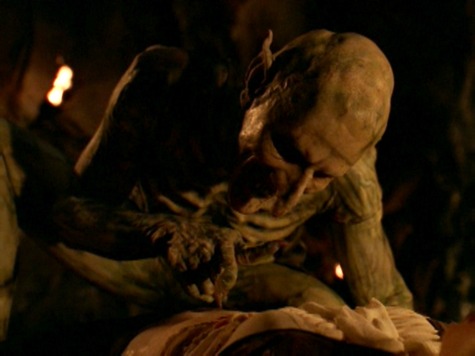
Gnarl’s table manners one of the more gory things seen on BtVS, in my opinion. I flinched every time he stripped himself a noodle-sized hunk of Willow and slurped it down.
Buffy and Xander develop a random idea that Anya needs to stay with Dawn while they return to the scene of the cave-in. She reveals that Dawn is posable—which is funny—and then manages to also come ’round to mentioning about how she helped Willow earlier that day. The truth comes out, and since she also knows Gnarl, BuffXander obliges her to come along with them. Dawn didn’t need a sitter after all, I guess.
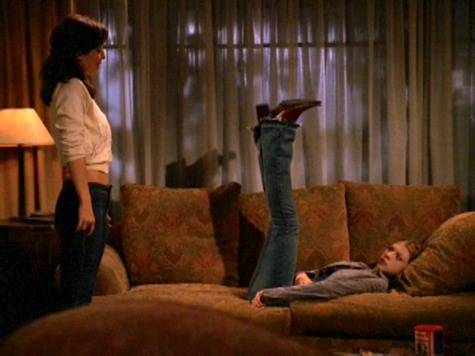
There’s a sprint back to the cave. Combat begins, and Anya reveals that Willow’s right there on the floor, somewhat hurt. BuffXander still can’t see her.
As the fight continues, Anya tells Willow she’s not alone. She’s paralyzed and bleeding from the belly, but she’s almost pathetically happy and relieved to learn she wasn’t deliberately abandoned to a horrible death.
In time, Buffy stabs Gnarl in the foot, to fix him in place and then—foreshadowing much?—she drives her thumbs into his eye sockets to kill him. When she does, Dawn falls off the couch, where the gang left her. Now Willow can move, too. Except, really, she’s too hurt.
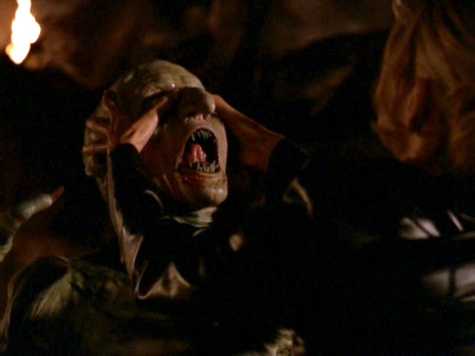
Anya, the one person who can see everyone in the cave, sprints off to fetch an ambulance, leaving Buffy and Xander to talk to Willow, even though they can’t see or hear her. Somehow she manages to reappear, and they get their reunion at last. There’s nothing like having the flesh nibbled off your abdominal cavity to ease those awkward tensions, right?
Next day, Willow’s meditating in her room and Buffy interrupts. They feel their way through their first real conversation since the big end-of-season showdown.
Willow confesses to having inadvertently caused their mutual inability to see each other. She was feeling unready, and scared of being rejected. Buffy has a confession to make, too: she thought Willow might be guilty of the flaying.
It’s a pleasing conversation. Mutual goodwill and trust is reestablished, and in the end the bond is strong enough that Buffy offers Willow some of her strength, by way of helping her grow her Gnarl-eaten belly back. They are friends again, connecting in all the ways they weren’t able to manage last season. The only thing missing is some kind of heart to heart between the two of them over Angel.
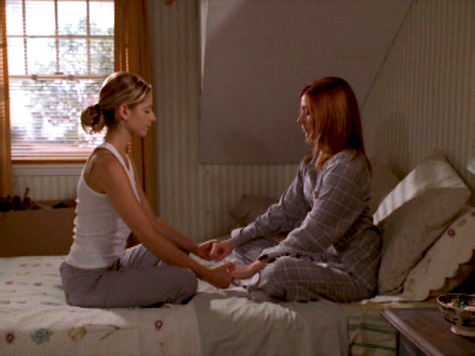
And on that happy note, we’ll leave them, holding hands and knitting epidermis together.
Next: You’ve saved one doomed teen, you’ve saved them all, right?
A.M. Dellamonica has a book’s worth of fiction up here on Tor.com! Her ‘baby werewolf has two mommies,’ story, “The Cage,” made the Locus Recommended Reading List for 2010. There’s also “Among the Silvering Herd,” the first of a series of stories called The Gales. (Watch for the second of The Gales, “The Ugly Woman of Castello di Putti”!)
Or if you like, check out her sexy novelette, “Wild Things,” that ties into the world of her award winning novel Indigo Springs and its sequel, Blue Magic.










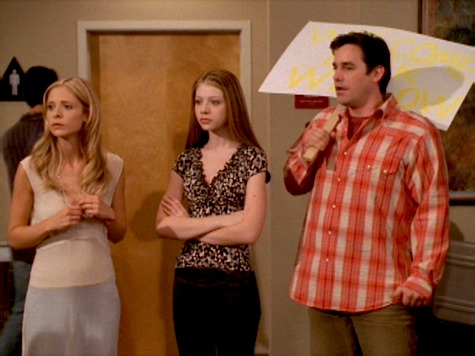
For me, Gnarl is the creepiest creep BtVS ever hosted — probably because of him peeling and eating the peels from Willow. I could not bear to watch that. Just beyond EEEEEEEEEEEEEEEEEEEEEEEUUUUUUUUUUU.
However, this was a brilliant way to bring Willow home and re-integrate with her friends. Also, that monster provides simultaneous punishment and atonement, lest we suspect Willow’s gotten off all too easy.
Though — it’s really hard for me to believe Willow needs it that much regarding what Dark Willow did to Warren, who pretty much created what he got. But then, I’m not the Slayer, with her ever more clarifying sense of right and wrong. I’m not as nice as the Slayer either.
Love, C.
I’m with you on the Ewwwwww! Zorra. I was surprised by how difficult I found that to rewatch!
I always really liked this episode, very poignant, and very fulfilling as their friendships rekindle. Lots of good symmetry & irony packed within.
Say what you will, I always thought the way Buffy treated Spike in this ep came off as rather callous. Use him for his tracking abilities, make a cheap joke at his expense, and then (presumably) dump him back into his hole ’til next time. Worse yet, we’ll find out he’s been killing again, driven by the FE. Ignoring him (her Inner Darkness) leads to much badness. Still, they need him in the basement, so that’s where he’ll stay (for now).
I’ve already mentioned the reference Spike makes to Gunga Din (“…carries the water, carries the sin”.) in an earlier discussion. IMO it’s partly connected to the gender-role reversal we saw in s6. Women have carried the sin (Eve and the apple) for centuries.
The scene with Willow out at the curb would’ve been the perfect chance for Anya to drop her little bombshell, re: Spike’s soul.
The final scene btwn Buffy and Willow is well-done. Buffy is willing to share her strength, so Willow needn’t worry about going dark like she will in Get it Done.
The Gentlemen (Hush) are still the creepiest BtVS villains for my money, but Gnarl runs a close second.
Another good episode, and another very good review of it. Thanks Alyx!
In all of the full-length seasons of Buffy, there’s a discernable pattern in that the first three episodes of each season usually outline and foreshadow the major themes and obstacles that the Scoobies are going to spend the rest of the season grappling with. What we see in “Lessons”, “Beneath You”, and “Same Time, Same Place” contains the crux of the dilemmas that confront Buffy, Spike, and Willow at the moment – the three characters who are going to matter the most to what happens in S.7 and the end of the series. (Helped along, I think, by the fact that Sarah Michelle Gellar, James Marsters, and Alyson Hannigan were probably the most consistently outstanding actors on the show)
All three of them are in different ways coming to grapple with the ur-theme of the season: “It’s about power.”
Buffy’s at the top of her game at the moment as the Slayer (love the way that she kills Gnarl by gourging out his eyes with her thumbs), but she’s dropping hints all over the place that the heavy burden of responsibility from being the Chosen One – singularly responsible for acting as Judge, Jury, and Executioner for all things mystical and malevolent – is weighing on her, and showing some serious accumulative effects on her emotional state of being after seven years on the job. This is going to lead directly to a fairly explosive outburst from her in “Selfless”, thereby setting up one of the several issues that are going to get plumbed to quite extraordinary effect in “Conversations With Dead People”, all this forming a vital prelude to the path she takes through the rest of the season leading to “Chosen”.
Willow is also struggling with a power problem, but we see fairly clearly that it’s one of a different kind: in the final episodes of the 6th season she finally realized the full extent of her powers as the most badass Wicca in the Western Hemisphere, and as a result she’s far too terrified of herself to utilize more than a tiny fraction of her potential throughout most of the season. In a lot of ways, I think that Willow’s arc in S.7 is a matter of her coming fully circle as a character: more than anything else, her growth throughout the first five seasons of the show was all about growing her self-confidence as a person, which was then utterly smashed by what happened in Season 6. In the last season she has to rediscover it, and locate it on a much firmer basis than she did before. Personally I think that this was well done.
Spike’s journey in this season is also closely related to the power theme, albeit in a more sublte way, I think, than is the case with Buffy and Willow. He spends most of the season with his mind literally under the power of the First Evil and causing no end of strife as a result, but that’s just a symptom of his real problem, rooted in the internal conflict sparked by the return of his soul. The FE is able to manipulate him in the way that it does by playing on the guilt and remorse that he now feels, for the first time, for all of the evil deeds that he committed as a vampire. The fact that it is able to stir powerful emotional responses from him is the key to why its hold on Spike is so strong over the season. More than any other main character on the show, Spike has always allowed his passions to override his judgement, in almost any situation. The fact that the writers made overcoming this deep-seated trait part of the culmination of his series-long journey is one of the main reasons that I consider Season 7, whatever its other flaws, to be an exhibit of exceptional character development.
Moving on to some comments more specifically addressed toward this episode, I’ll add my voice to all those who said that they were completely creeped out by Gnarl, who is one of the very few genuinely terrifying Monsters of the Week in the seven seasons of Buffy. He’s not quite my pick for the best MOTW to come out of the season, but he’s up there, no doubt.
The ending scene between Buffy and Willow lacked the strength of the Church Scene from “Beneath You”, but I love it all the same. When I first watched this season I was curious to see how and if the writers would be able to convincingly integrate Willow back into the Scooby Gang, and was very pleased with the way that they pulled it off. Apart from being quite touching, there’s also a good deal of foreshadowing going on in that scene, which I found made it work even better on the re-watch.
Anya’s role in this episode was also one that I greatly appreciated on a second viewing, with further touches being laid on the build-up for “Selfless”.
@@.-@.
Personally I’d be more inclined to describe her treatment of him in the first episodes of this season as “saint like”.
Given that their last interaction in the previous season was Spike attempting to rape her, I can completely sympathize with Buffy treating him rather brusquely even after she finds out about his soul.
To repeat something that I said in a comment last week, I consider the way that the writers went about rekindling the Spuffy relationship to be one of the highlights of this season – after everything that happened between them in Season 6, getting them back together again in a manner that felt emotionally realistic and organic was no small thing, and TBH I’m still somewhat surprised that it worked as well as it did.
We get a much better handle on what Buffy’s feelings about Spike are at the moment in “Him” and “Conversations With Dead People”, and then see their relationship start to develop again in earnest in “Sleeper” and “Never Leave Me”.
@6. Saint-like?!? Srsly?
A. By helping him, she’s helping herself.
B. Would I feel obligated to help someone who’d helped me on multiple occasions? Yes. Yes, I would.
C. Willow tried to kill her and her sister and destroy the world.
@7, What Willow did was out of character and driven by grief, hence to easy to forgive. Spike, on the other hand, did that to people not named Buffy Summers for centuries. Not so easy to forgive.
Gnarl, with his immunity to magic, could’ve been quite the asset if they’d come across him a few episodes earlier when Willow was terrorizing the world.
@5. You can’t have a real discussion of the power w/o considering its source. The source of the Slayer’s power is Darkness. The source of Spike’s power is Darkness. The source of Willow’s power is Darkness.
@8. I seem to recall someone arguing that Spike wasn’t responsible for the things he did pre-soul. Hmmm…who was that?
What he did was wrong, no question. He’s done a lot of bad things. He also did some good (as Tara herself pointed out; considering some of that good accrued to herself). What Willow did was also wrong. Some folks need to climb down off their high horses.
@10.
Particularly as regards to Buffy (and Willow) this could not possibly be more wrong in my view, or rather, more at odds with what we actually see and hear in many of the most important episodes in the show that actually deal with this very question.
Beginning in Season 5 (after some foreshadowing in S.4), the audience is introduced to the idea that the Slayer’s power is rooted in Death and Darkness, most prominently in the episodes “Buffy vs Dracula” and “Fool For Love”. This works very well, because it’s a pretty cool and compelling theme, and also because it jibes with some of what we’ve seen previously of Buffy’s character, which indicates that there’s a not insignificant part of her that is powerfully attracted/drawn to darkness in general and vampires in particular. Much later in Season 7, this is substantiated to a certain degree in “Get It Done”, when we finally learn the awful truth behind the history of how the First Slayer was created – with the implication that Buffy’s power is the legacy of an act of gross violation. Dark stuff, indeed.
What your comments seem to indicate that you missed, however, is that the story doesn’t give us the above points and then leave it at that. Instead, the 5th, 6th, and 7th seasons all go on to clearly establish through subsequent developments that although Dracula/Spike/First Slayer weren’t incorrect to detect the presence of darkness in Buffy, they were dead wrong (pardon the pun) to identify it as the essence of her power, and who she is as a person. As Buffy puts it to the FS in “Restless”:
“You’re not the source of me.”
And while Buffy’s obviously not entirely correct here either (it’s in the next episode that the inner darkness theme starts getting developed), in the long run the show comes down quite clearly on her side. Dark magic might have been responsible for giving the Slayer her strength and ability to kill things, but strength alone is inadequate to understanding what the Slayer is (or is supposed to be). This is most powerfully hinted at in “Intervention”, when Buffy hears from the spirit guide that Love, not Death or Darkness, is the key to understanding what makes the Slayer tick, and this insight later provides the key (heh) to Buffy’s revelation at the end of “The Gift”.
At the end of the day, it’s not the darkness tied up in the origins of the Slayer that Buffy draws on to fuel her power, it’s her own emotions and strength of character (as we’ve known ever since Season 2), and her compulsive love of humanity and desire to help people. This is pretty much the entire point of how her relationship with Spike develops in Season 6. If Death and Darkness really were the source of Buffy’s power, then drawing closer to Spike (who pretty much embodies both of those things for her at that time) ought to have strengthened her. Instead, she comes to realize (correctly) that the relationship was slowly killing her, not helping her, and acted accordingly (the emotional fallout to S.6 Spuffy gets some excellent treatment in “Conversations With Dead People” and “Never Leave Me”). Similarly, in “Get It Done” Buffy rejects the attempt by the Shadow Men to increase her power at the expense of her humanity, because she has the self-knowledge to realize that the latter is far more valuable to her than the former could ever be.
This all get driven home by, in one of the show’s most delicious ironies, Spike, who, when he finds Buffy in “Touched” at her lowest moment of the season, rekindles her fighting spirit by affirming not the negative parts of who she is (as he did in S.6) but the positive ones, in one of the most touching (heh) bits of dialogue ever served up in the show, and thereby helps her to the realization that will enable her to beat Caleb, get the Scythe, empower the Potentials, and win the day.
The same points broadly apply to Willow and, with obvious points of departure, to Spike, both whom ultimately achieve their self-actualization not by relying on their inner darkness for strength, but by moving past it to affirm the best parts of themselves.
@7.
Yes, seriously.
The idea that Buffy helps Spike for reasons of selfishness is ludicrous, and bears no relation at all to what we see on the screen. He’s useful occasionally, but it’s obvious that has nothing to do with why she’s helping him – as will become clear in the episodes to come. Nor is she under any sort of “obligation” to help him – that idea is simply perverse.
She helps him simply because helping people in need is a huge part of her natural inclination, regardless of whether or not they’re people who she would normally not be inclined to have anything to do with at this point.
If Buffy’s feelings about Spike at the moment weren’t a giant tangle of complexity, then it would beggar belief. She looks past that, however, to treat him as she thinks he needs to be treated as she learns more and more about what’s wrong with him over the first half of the season.
The way that she does so, in my view, speaks volumes her as a character, and makes me respect the hell out of her.
Moving on to further address the dichtomy between the Scooby response to ‘rehabilitated’ Willow vs their response to ensouled Spike, it’s really no different to most of the discussions that we’ve previously had on subject of the Scoobies’ relations with their ‘formerly evil’ companions – that is to say, it all boils down to personal and emotional history.
Buffy (as well as Dawn, Xander, and Giles) is able to reconnect with Willow fairly easily after she returns to Sunnydale in this season because the two of them have a long history of mutual friendship, love, and respect to draw on. Granted, she did try to destroy the world, but it was under circumstances that were, while not in any way extenuating, at least highly unique. It’s similar to the dynamic that enabled the Scoobies to effortlessly forgive Buffy after she tried to kill them all in “Normal Again” – these guys stick together, even when they seriously screw up.
Spike on the other hand, has never had a genuinely close relationship with any of the SG, possibly excepting only Anya. Before this season, the closest that he ever got to Buffy was when she was coldly using him as an outlet for her self-hatred and depression in Season 6. Not, in other words, the sort of history that they can draw on to come back together again easily. That’s really what I love about the Buffy/Spike relationship in this season – they basically have to start again from scratch (“back to the beginning…”), and actually form a proper bond based on trust. Because Spike now has a soul, and Buffy is no longer depressed, they succeed this time.
I’ve been thinking of Scoobs forgiveness of each other and their other related personalities including Spike in the context of the revelations of behaviors that go far beyond ‘fail’ in Scandal.
I have no trepidation forgiving and moving on with the figures in BtVS at all. I’m thrilled when they’re all together again as a team, when there is another authentic addition to the team (which leaves out Andrew imho, for instance). But in Scandal I am only more and more disgusted and appalled by all the characters. Is the difference partly because with BtVS these are all still essentially kids struggling with their place in the world, their identies, even though some of them like Anya are a thousand years old? By contrast in Scandal these are all adults, long steeped in the wielding of political and other kinds of power, all of them at the top of a variety of national power structures, so I see their evil creating (reflecting) evil justified as political necessity, that affects me personally, as I live in this country?
Eh. Just me maundering. But I keep liking these BtVS people and I loathe the Scandal people.
Love, C.
@14. Great comment – I agree completely.
I’m still managing to tolerate Scandal, mostly because I live close to D.C. and find the characterization of the city’s culture of sleaze to be hilariously insightful at times, even if it’s ludicrously over the top (TNR has a great take on this aspect of the show, amongst others, here).
The characters are pretty much one big pile of messy unlikeability at this point, but I’ve enjoyed other shows where I don’t really like any of the characters – Mad Men is a great case in point.
To come back to Buffy, I think that one of the great successes of the show was the way it often managed to strike the fine line of retaining audience sympathy for the characters even at the times when they behave in extremely unsympathetic ways, and furthermore succeeding in making the reasons for that sentiment readily discernible. As was brought up in a few of the comment threads, this is something that I think lies at the heart of the 6th season, especially.
It was only in the 7th season, I think, that the writers started to sometimes drop the ball in this regard, mostly in the season’s latter half (which is where I think that most of S.7’s problems are contained). Giles was a principal victim of this, but the same weakness extended to a lot of the season’s minor characters (almost all of the Potentials, especially Kennedy, and also Wood to a certain extent). It especially comes to a head in “Empty Places” – probably the S.7 episode that takes top prize for getting the audience angry at just about all of the characters.
To pick out the line that I liked most from the article linked to above:
“For all its strengths, “Scandal” is the most paranoid of the Washington shows. That helps explain why its characters, while entertaining, don’t feel human.”
The latter sentiment pretty much nails what I love as one of the core sentiments of BtVS – even at the show’s lowest moments, the characters still feel human, even when they’re not human at all.
Spike and Angel both obviously feel some responsibility for the things they did while sans-soul. How much they are, I think, is something the Buffy canon leaves open to our interpretation.
@15 — Thank you, for thinking about the same things too!
But I have to say this about the contents of that link you provided:
Surely he jests! I was there and what I was seeing was D.C. amok, which it had been already for decades. I could not understand why people kept seeing West Wing as at all ‘real.’ I really could not buy any of it, which is why I’ve never been able to watch it.
Whereas, as you note, I am watching Scandal despite the loathesomeness, moral bankruptcy and sheer monstrousness of them all! (Well, there’s Harrison, but we never see much of him. :)
Love, C.
@17. I have a slightly different take on it, but it’s one I think is best left for the discussion of “Lies My Parents Told Me” – the episode which deals directly with this very question.
@18. I guess it just goes to show (again) the power of reputation to trump reality any day of the week.
Personally I’ve always subscribed to the notion that for a lot of fans, a large part of The West Wing‘s appeal was as a happy fantasy of what we wished our government could be, rather than what it actually was.
Despite its ups and downs, I think that it has aged fairly well so far – I did a complete re-watch a couple of years ago, and enjoyed it well enough.